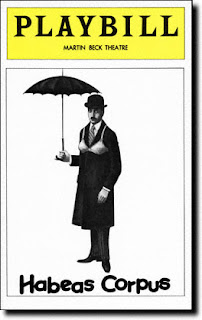Celeste Holm
 |
| 1917-2012 |
 |
| The original cast of Oklahoma! |
 |
| The lady had polish. |
Richard Rodgers was right, though, when he noted Holm's natural polish. She portrayed all sorts of characters in a career which lasted over sixty years, and her most memorable appearances were indeed ladies with "polish."
 |
| Holm's follow-up to Oklahoma! was the Harold Arlen rarity, Bloomer Girl. |
She earned three Oscar nods, including the role for which all theatrical junkies will best remember her, as Bette Davis's wavering best friend Karen in All About Eve (she lost to Josephine Hull from Harvey; Celeste won the award for her supporting turn in Gentlemen's Agreement).
 |
| Celeste and her 4th husband, Wesley Addy, occasionally worked together, including a stint on the soap Loving. |
 |
| Celeste earned an Emmy nod in the miniseries deemed "Upstairs/ Downstairs at the White House." |
 |
| Rodger's and Hammerstein's TV musical Cinderella received a major remake in the mid-60s. It was my first encounter with Celeste Holm. |
 |
| Allan Bennett had an early flop with this British sex farce. I saw it. Celeste Holm was in it. |
Frankly, I don't remember her at all in the Broadway production of Alan Bennett's sex farce Habeas Corpus (I wrote about seeing that show here), but I certainly remember her work in I Hate Hamlet (in fact, it was her presence in the show which encouraged me to see it, only a day after the show's star caused an onstage uproar. I wrote about that here). Sadly, this sophisticated, "polished" lady was forced into relative poverty in her later years, when she married a some-time opera singer (and some-time waiter) who was 45 years her junior.
 |
| Celeste's marriage to her 5th husband ignited a family brawl which bankrupted our gal. |
Her sons from her various previous marriages objected, and they dragged their mother through the courts during the last years of her life. Holm lived in relative poverty in her home on New York's Central Park West, an apartment she purchased for $10,000 decades ago but which is now valued at well over 2 million. She was recently sued for being delinquent on her homeowner dues, and was reportedly living only on her Social Security pension when she died this week at the age of 95, estranged from her sons.
This week's Dance Party deals with the double-edged sword of wealth and privilege. It comes from one of Celeste's movie musicals, High Society. It's the musical version of the Philip Barry classic The Philadelphia Story, with a score by Cole Porter, and features the final film appearance (and only musical role) of Grace Kelly.
 |
| For the musical, Cary Grant, Katherine Hepburn, and Jimmy Stewart were replaced by Bing, Princess Grace, and Ol' Blue Eyes. |


































,+Olney+Theatre+Center,+2004.jpg)



,+Shakespeare+Theatre+Company,.jpg)


,+Warehouse+Theatre,+1999.jpg)
,+Are.jpg)
,+Everyman+Theatre,2002.jpg)
,+First+Nationa.jpg)
,+Shakespeare+Theatre+Company,.jpg)






,+Granada+Th.jpg)
,+Globe+Playhouse,.jpg)
,+CSUN,+1976.jpg)


